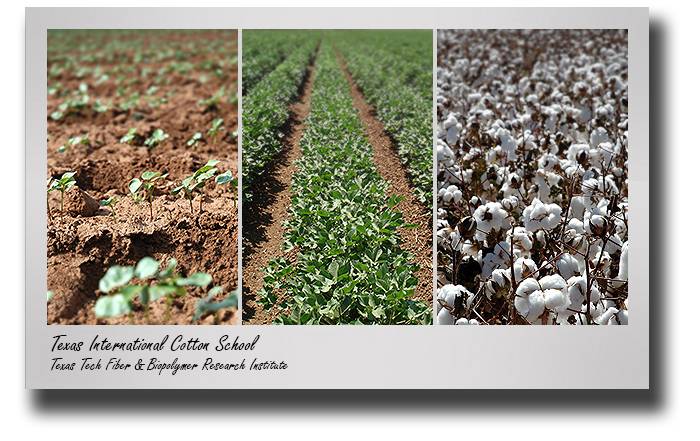Focus on Fiber; Texas International Cotton School scheduled for Aug. 6-16
By: Norman Martin
Texas Tech University's Fiber & Biopolymer Research Institute, in conjunction with the Lubbock Cotton Exchange, is hosting the 38th session of the Texas International Cotton School. Running from Aug. 6-16 the High Plains program is two weeks of classes, lectures, tours and hands-on interaction in all phases of cotton production, harvesting, ginning, classing, testing, preparation and processing.
 "The goal is to allow students and professionals to better understand the global cotton
industry," said Annalisa Clark, communication and recruiting coordinator with Texas Tech's Department of Plant and
Soil Science. Since its inception in 1989, more than 600 students from 60 countries
and 17 U.S. states have attended the course. Texas, the nation's leading producer
of cotton, annually produces approximately 25 percent of the entire United States'
cotton crop.
"The goal is to allow students and professionals to better understand the global cotton
industry," said Annalisa Clark, communication and recruiting coordinator with Texas Tech's Department of Plant and
Soil Science. Since its inception in 1989, more than 600 students from 60 countries
and 17 U.S. states have attended the course. Texas, the nation's leading producer
of cotton, annually produces approximately 25 percent of the entire United States'
cotton crop.
The curriculum's fluffy-fiber focus is U.S. cotton production, processing and marketing systems, along with an examination of the industry's latest machinery and equipment. "This is a hands-on course that covers all phases of production, harvesting, ginning, classing and testing," Clark said.
The curriculum for this year's session includes:
• Field to fiber; fiber to yarn; yard to fabric
• Breeding strategies, production systems, cottonseed biotechnology
• International market promotion; international arbitration; trade finance; cotton
insurance
• Precision agriculture; sustainability issues; pima cotton; cotton ginning and classing;
bale selection
• Fiber properties and measurements; contaminants; textile chemical process; yarn
& fabric properties
• Marketing Topics: cotton economics; futures & options; contracts; government programs;
role of the merchant; exports; U.S. certification and delivery process through the
ICE
Among the scheduled tours are Bayer CropScience-global cotton headquarters; USDA Classing Office to see how cotton is classed via HVI; farm tours to see various types of cotton farming (drip irrigation, pivot irrigation, and dryland fields); Farmers Compress with its 2.2 million bale storage capacity; and several dinners/social gatherings to meet and network with members of the Lubbock Cotton Exchange.
Located some six miles east of the main campus, FBRI occupies 110,000 square-feet of space allowing Tech researchers to conduct testing and evaluation from the raw fiber stage through the finished textile product. Facilities include a multimedia classroom and conference room, biopolymer research laboratory, cotton phenomics laboratory, cotton ginning laboratory, and cotton processing laboratory (spinning and weaving).
CONTACT: Annalisa Clark, Communication & Recruiting Coordinator with joint appointment with the Fiber and Biopolymer Research Institute, Department of Plant and Soil Science, Texas Tech University at (806) 834- 4232 or annalisa.clark@ttu.edu
0716NM18 / Editor's Note: For more information on Tech's FBRI, please click here
Davis College NewsCenter
-
Address
P.O. Box 42123, Lubbock, Texas 79409-2123, Dean's Office Location:Goddard Building, Room 108 -
Phone
(806)742-2808 -
Email
kris.allen@ttu.edu
